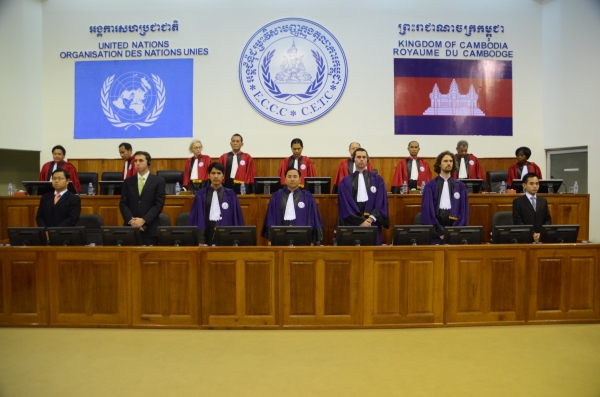Countries in which mass atrocities have occurred usually have poorly functioning judicial systems. Most of the time, they do not have the institutional capacity to investigate or try cases, or they lack the relevant legal framework to conduct fair, impartial and independent proceedings. Crime and corruption may also be endemic and flourish, often with the support of people in power. Accountability for international crimes can thus be resisted or extremely difficult to achieve.
In such circumstances, hybrid jurisdictions have proven themselves to be a viable model of justice. They are constituted primarily for the purpose of combating impunity and delivering justice to victims. Usually they are mandated with the adjudication of serious violations of international law in line with international standards. In particular, because of their hybrid structure, hybrid courts combine the potential advantages of national prosecutions (such as geographical and psychological proximity to victims) with the benefits of international involvement (such as security, impartiality, and independence).
Because of their different features, it is not always easy to decide whether a particular court fits the typology of a hybrid court. For many, the sine qua non condition is the participation of international staff, in particular international judges and prosecutors, in national processes. Their presence is seen as a safeguard in support of impartiality and independence, as well as adding expertise in international criminal justice and fair trial norms that may not be available locally. Furthermore, depending on the context, hybrid courts have also been modelled on both civil and common law traditions, consistent with national practice. Despite the existing differences, certain common features can nevertheless be identified, such as their jurisdiction over core international crimes (war crimes, crimes against humanity, genocide, and torture).
Given the potential need to create future hybrid tribunals, as well as the need to support those already created, this report, published by the International Center for Transitional Justice, takes an in-depth look at some of the key lessons learned from the practices of five hybrid criminal tribunals, providing an important guide for practitioners working in the field of international criminal law.
As stressed by the author, Elena Naughton, “establishing a hybrid tribunal gives rise to numerous challenges at almost every stage, from startup, to the initiation of investigations, to prosecutions, and ultimately to trial, judgment, and sentencing”. Indeed, although investigations of war crimes and crimes against humanity share certain commonalities with investigations of common crimes, the scale and patterns of the abuses are usually of a different order of magnitude. War crimes investigations often encompass massive numbers of incidents occurring over a large geographic area and involving a range of actors, including army forces, police, paramilitaries, politicians, rebel groups, and other non-state actors. Furthermore, “along with establishing the individual responsibility of perpetrators for particular acts or incidents, prosecutors may need to establish contextual circumstances, e.g., patterns of violence and a chain of command that includes not only persons who gave orders to commit crimes, but also those who failed to take action to prevent or punish crimes that they knew (or should have known) were being committed”. For crimes against humanity, on the other hand, “it is necessary to show not only that one or more prohibited acts occurred, but also that they occurred within the context of a widespread or systematic attack against a civilian population”.
These realities may complicate decisions around prosecutions. As a result, many hybrid courts have brought forward their cases based on what is readily doable, taking into account the mandate received, the applicable law, the estimated number of cases, suspects, victims and witnesses, the possible cooperation from other states or jurisdictions, their funding etc.
Hybrid courts have long been criticised for prosecuting a relatively small number of perpetrators in contexts where hundreds of people were involved in the commission of crimes. Despite all criticisms, this report shows how these judicial mechanisms can still offer a practical, feasible, and meaningful option for filling the impunity gap, especially in contexts where national judicial processes are underdeveloped, or where capacity is so lacking that trials are unlikely to meet international standards. Oftentimes, the political obstacles to national trials, including entrenched and dominant interests opposed to accountability, are so great that only international backing and the involvement of international staff can ensure that trials move forward fairly. As such, hybrid tribunals continue to have enduring appeal.
A recent example is represented by the Kosovo Specialist Chambers & Specialist Prosecutor’s Office, located in The Hague (The Netherlands), formally established in 2016 and mandated with investigating and prosecuting war crimes, crimes against humanity and other crimes under Kosovo law which allegedly occurred between January 1998 and December 2000.
Written by Federica Pira
To read more, please visit:







